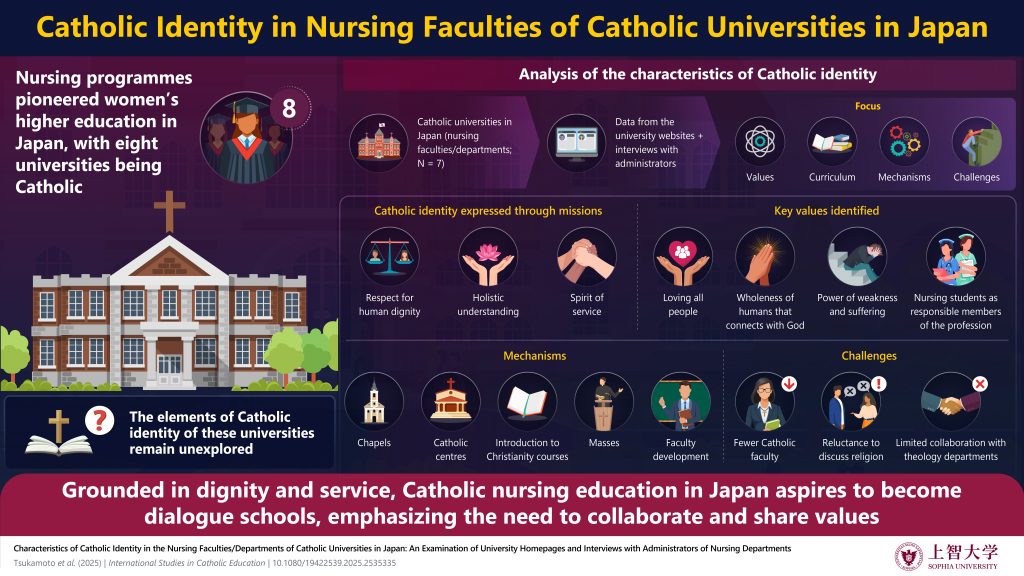Nursing Faculties of Catholic Universities in Japan Instill Unique Values of Compassion, Dignity, and Service

Nursing faculties at Catholic universities in Japan highlight love, wholeness, resilience, and professional responsibility as core values
Nursing education plays a crucial role in shaping compassionate healthcare professionals, yet many universities in Japan rely heavily on standardized curricula, leaving little room for distinctive approaches.
In a recent study, scientists examined Catholic universities’ nursing faculties to identify their unique characteristics. They found four core values—love for all people, wholeness in relation to God, resilience through suffering, and professional responsibility—demonstrating how Catholic social doctrine enriches nursing education.
Nursing education is not only about clinical skills. It also shapes the values, attitudes, and sense of responsibility of those who provide care. In Japan, most nursing programs follow government-prescribed curricula that emphasize qualifications, leaving limited space for universities to articulate their own missions. Catholic universities, however, stand apart. Their nursing faculties embed spiritual and ethical perspectives, placing compassion, dignity, and service at the heart of the profession.
A study led by Professor Naoko Tsukamoto with Ms. Aya Watanabe, Ms. Yoko Takiguchi, and Ms. Yukiko Katagiri from Sophia University’s Faculty of Human Sciences, Department of Nursing, Japan, published online in the journal International Studies in Catholic Education on August 05, 2025, examined how Catholic identity is expressed in Japanese nursing faculties.
The researchers identified the values that Catholic nursing faculties emphasize and the ways they are transmitted to students by analyzing university websites and conducting interviews with nursing administrators.
Prof. Tsukamoto explains, “This study identified four key values cherished by nursing faculties/departments in Catholic universities in Japan: ‘loving all people,’ ‘wholeness of humans that connects with God,’ ‘perspective on the power of weakness and suffering,’ and ‘nursing students as responsible members of the nursing profession.’”
The study found that these values are actively embedded in education and align with Catholic social doctrine. As Prof. Tsukamoto notes, “Nursing faculties/departments in Catholic universities in Japan are disseminating values consistent with the Catholic social doctrine, making efforts to disseminate them through various mechanisms, and to express sufficient Catholic identity, in both form and content.”
The impact of these values extends beyond classrooms. Students often feel drawn to Catholic universities by their mission, study diligently, and graduate as compassionate professionals. Prof. Tsukamoto adds, “Students drawn to nursing faculties/departments at Catholic Universities enroll because they are captivated by its educational mission. Throughout their training, they study diligently, absorb its values, and graduate as caring nurses.”
These values, the study suggests, ultimately shape patient care. Nurses trained in Catholic faculties are more likely to offer comfort that enhances resilience and supports recovery or a peaceful death. By integrating faith-based perspectives with professional training, Catholic universities provide an education that is both distinctive and deeply human.
To foster these values, faculties use multiple mechanisms. Curricula include compulsory courses, such as “Introduction to Christianity” and “Christianity and Bioethics.” Chapels, Catholic centers, and regular Mass provide opportunities for reflection, while student groups and volunteer programs create community. Practical training—often beginning in the first year—allows students to live out these values in real-world care, from supporting terminally ill patients to assisting in disaster relief.
While challenges remain, including limited Catholic staff and uneven collaboration between nursing and theology departments, Catholic nursing faculties in Japan continue to sustain their identity. The study concludes that their mission not only enriches nursing education but also offers a distinctive appeal for prospective students seeking meaningful careers in healthcare.
Looking to the future, the influence of Catholic nursing education may grow stronger over the next decade. Graduates who embody love, wholeness, and responsibility could help reshape healthcare in Japan, ensuring that compassion and dignity remain central to nursing in an increasingly technical world.
Reference
- Title of original paper
Characteristics of Catholic identity in the nursing faculties/departments of Catholic universities in Japan: an examination of university homepages and interviews with administrators of nursing departments
- Journal
International Studies in Catholic Education
- Authors
Naoko Tsukamoto1, Aya Watanabe1, Yoko Takiguchi1, Yukiko Katagiri1, Nahomi Takeda2, Megumi Kodaka1, Yae Yoshino1, Yuka Funaki1, Hiro Yamagata1, Kazuyoshi Terao3, and Shinichi Tsukamoto4
- Affiliations
1Department of Nursing, Faculty of Human Sciences, Sophia University, Tokyo, Japan
2Department of Theology, Faculty of Theology, Sophia University, Tokyo, Japan
3Graduate School of Applied Religious Studies, Master’s (Doctoral) Program in Death and Life Studies, Sophia University, Tokyo, Japan
4Department of Child Psychology, Tokyo Future University, Tokyo, Japan
About Professor Naoko Tsukamoto
Professor Naoko Tsukamoto is a faculty member in the Department of Nursing at Sophia University. She is a registered nurse with a Master’s degree in Psychology from Rikkyo University and a Ph.D. in Health Science from the University of Tokyo. Her research focuses on social psychology and basic nursing, with emphasis on caring education and on promoting the integration of technical skills with empathy and compassion in clinical practice.
Prof. Tsukamoto is an honorary member of multiple academic societies, including serving as a member of the Editorial Committee of the Academic Journals of the Tokyo Nursing Association. She has published more than 50 articles, with more than 80 citations.
Funding information
This work was supported by the Sophia University Special Grant for Academic Research.
Media Contact
Office of Public Relations, Sophia University
sophiapr-co@sophia.ac.jp